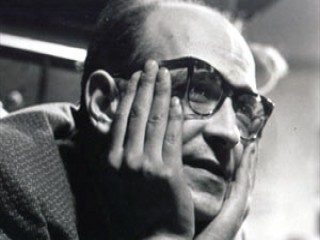
Karel Reisz biography
Date of birth : 1926-07-21
Date of death : 2002-11-25
Birthplace : Ostrava, Czechoslovakia
Nationality : Czech-British
Category : Famous Figures
Last modified : 2011-09-21
Credited as : filmmaker, Patsy Cline,
0 votes so far
Reisz's surname is pronounced "rice," revealing his German-Jewish roots in the city of Ostrava, a mining and industrial city in what was then the Moravian part of Czechoslovakia. His father was a lawyer there, and both parents, suspecting an imminent invasion of Czechoslovakia by neighboring Nazi Germany in 1938, sent the 12-year-old Reisz and his brother to England as part of the "Kindertransport" program. Reisz's trip was sponsored by a Quaker school in London, where he quickly learned English. After the war's end, the boys learned that both parents had died at Auschwitz, the German-run concentration camp in Poland.
At his London school Reisz first began making 16-millimeter films, and belonged to the Oxford Film Society during his time at the renowned university. There, with future directors Tony Richardson and Lindsay Anderson, he founded Sequence, the film society's magazine. After earning a chemistry degree from Oxford's Emmanuel College, Reisz became a schoolteacher in London, but wrote film reviews on the side. He left the teaching profession in the early 1950s to take a job as the program director of England's National Film Theater. He also became a highly regarded film-editing professional, and even authored a seminal textbook on it.
At the National Film Theater, Reisz teamed with Anderson and Richardson again to launch its "Free Cinema" film series, which promoted the work of young auteurs, including themselves. The Free Cinema term soon came to be used to define a new style of British filmmaking, characterized by daring works that tackled gritty, working-class themes. Reisz's own first film was a 1958 documentary, We Are the Lambeth Boys, about a youth club in London. Two years later he earned critical acclaim for Saturday Night and Sunday Morning, which was actor Albert Finney's first starring role as a loutish, put-upon factory worker. Lyman, writing in the New York Times, termed it "one of the seminal works of the British New Wave." Reisz's bleak, honest portrayal of life in an industrial city-based on Alan Sillitoe's novel-popularized the memorable line, "Don't let the bastards grind you down."
Reisz worked again with Finney four years later in 1964's murder-thriller, Night Must Fall. His next work starred a young Vanessa Redgrave as the socialite wife of an unstable artist in 1967's Morgan: A Suitable Case for Treatment! Redgrave also worked with Reisz on an ill-fated biopic about the modern dancer Isadora Duncan, who died in 1927 when her long scarf became entangled in the spokes of her car's wheel. The finished version of Isadora clocked in at three hours at its 1968 debut, and earned terrible reviews. Reisz cut nearly an hour from it and re-released it under the title The Loves of Isadora, but this version also failed at the box office. The expensive debacle seemed to mark the end of one period of Reisz's career. As film critic Richard Schickel told the Los Angeles Times writer Dennis McLellan, Reisz did not produce enough "hits" later in his career to become a household name, but during the 1960s, "the spirit of the time matched his sensibility: a director trying to make movies that didn't fit the conventional mold," Schickel asserted. "But it was a relatively brief moment where people took him with great seriousness."
Reisz even retreated from filmmaking altogether for a time, but returned in 1974 with The Gambler, the first of his works made in the United States. A critical favorite, it starred James Caan as professor with a gambling addiction. Who'll Stop the Rain, a 1978 drama that featured Nick Nolte as a Vietnam veteran turned drug smuggler, also earned Reisz praise. Perhaps his best-known work was The French Lieutenant's Woman, released in 1981 to enthusiastic critical acclaim. An adaptation of a novel from John Fowles, with a screenplay written by playwright Harold Pinter, this story of repressed desires was set in nineteenth-century England and the modern era and featured a young Meryl Streep and a relative unknown, Jeremy Irons, in dual roles.
Reisz also made Sweet Dreams, the 1985 biopic about late country-and-western star Patsy Cline, and cast Nolte in another film, 1990's Everybody Wins, from a script by playwright Arthur Miller. Over the next decade, Reisz directed works for the stage by Pinter and Miller.
Reisz's marriage to Julia Coppard ended in divorce; he married actress Betsy Blair in 1963. Reisz died on November 25, 2002, of a blood disorder; he was 76. He is survived by his wife; sons from his first marriage, Matthew, Toby, and Barney; a stepdaughter, Kerry; and seven grandchildren.
















